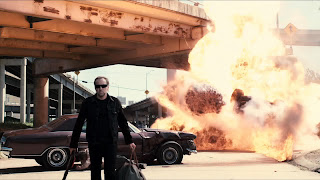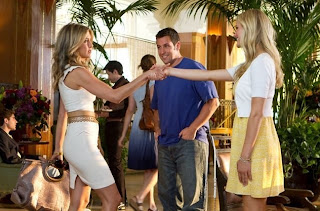...that have stayed with me.
I know, I know... how can one possibly narrow down a category such as this. You could reasonably argue that
all movies are, in one way or another, about love...
When Kyle Reese (Michael Biehn) chooses to go on the mission back in time to save Sarah Connor (Linda Hamilton) in James Cameron's "The Terminator", he does so because he has fallen in love with her. And in the adventure story "Rob Roy", when Robert MacGregor (Liam Neeson) finally engages in a sword duel with the vile, foppish Archibald Cunningham (Tim Roth), he does so to avenge the assault on his wife (Jessica Lange) and regain his honor.
There are tons of other examples like that. So, what I've done here is compile a list of ten movies that deal, in various ways, with one-on-one romantic relationships. But even that, I've discovered, is no easy task. I mean, there are literally
thousands of movies that could fall into this category, and trying to rank ten of them is borderline lunacy. As a result, I've opted to leave out the most obvious selections. The highest-echelon romances won't be included here. No "Gone with the Wind", "An Affair to Remember", "Sophie's Choice", "Moonstruck" and on and on. (There are so many that could be included here, so don't be shocked if your personal favorite romantic movie isn't listed below.)
Also, I've decided to leave out the most-well-known-but-not-quite-classics. These can include everything from the very good romantic comedies ("When Harry Met Sally", "Say Anything") to the decent romantic dramas ("The Notebook") to more modest fare ("Titanic") to the downright overrated ("Sleepless in Seattle").
So what does that leave? Well, I'm not saying what follows are the
best romantic movies. Or even the most
romantic romantic movies. These are ten selections that resonated with me for one reason or another.
Let us begin...
# 10 - "When a Man Loves a Woman"
A movie about the struggles of overcoming substance abuse, it's the love relationship between Michael (Andy Garcia) and Alice (Meg Ryan) that is the true driving force to the story. The film is about more than one spouse's addiction to alcohol. It's about how her recovery has a crippling effect on the way he views the marriage. ("
It was so much better in the old days, wasn't it, Michael? I'd get drunk, I'd fall apart, and you'd put me back together. That made you feel good! And that's what hurts!") This movie deals with substance abuse, but isn't really about it. It's about a love relationship, through and through. The film is so rich in its details... so effective at crystallizing the truth that even change for the best can be brutal for the journey itself.
# 9 - "About Last Night..."
This movie hit theatres in 1986. That's crucial, I think, to its success. It was released prior to the romantic comedy being homogenized down into an Aniston-friendly-PG-fare. The screenplay by Tim Kazurinsky and Denise DeClue was based on the David Mamet stage play "Sexual Perversity in Chicago" which explains the healthy dose of terrific zingers...
"You know, Joan, if you didn't have a pussy, there would be a bounty on your head--" followed up by
"And you are a schizophrenic, psychopathic, maladjusted social misfit who is clearly in the middle of a very deep homosexual panic." But "About Last Night..." is more than just funny. It's also smart and honest. I admired how it dealt with the relationships between the lovers and their closest friends and how those relationships altered as a result of their union. Most movie romances too easily exist in a vacuum. This movie is far more intelligent than most.
# 8 - "Brokeback Mountain"
I didn't know what to expect from this movie. I didn't expect anything bad. (I've always admired the work of director Ang Lee.) I guess I just wasn't sure how I'd react to the impact of this type of story. I myself am not gay, though I've never been put off by homosexual unions. (Nor do I possess a suspiciously overzealous aversion to male nudity, though the film never quite ventures there.) The movie does a nice job of walking a narrative tightrope between an honest depiction of homosexual attraction without presenting it in an overly self-aggrandizing manner. The sex is dealt with, but not focused on. This is more a story of a forbidden love that lasts for years and greatly impacts Jack and Ennis as their lives attempt to veer down more "traditional" avenues.
# 7 - "Chasing Amy"
I'm a big admirer of Kevin Smith. The main thing I take away from his work is that he is not cynical. That's key. It's what makes his "Chasing Amy" the best, in my opinion, of his Jersey Trilogy. Yes, his dialogue is frank, explicit and funny. Yet the characters he creates are not masters of irony. They come right out with what they feel, warts and all. Whether it's a gay black man detailing the veiled racism in the Star Wars Trilogy ("
You got cracker farm boy, Luke Skywalker. Nazi-poster boy, blond hair, blue eyes. And then... you got Darth Vader. The blackest brother in the galaxy. We're talkin' Nubian God!") or a comic book author debating the sexual preferences of Archie and Jughead ("
You're out of your mind, Archie is not fucking Mr. Weatherbee!"), Smith's characters revel in their respective passions. But what makes "Chasing Amy" so effective are the blossoming feelings Holden (Ben Affleck) has for his lesbian friend Alyssa (Joey Lauren Adams). In the world of Smith, her sexual preference is no match for his feelings, and the movie is brave enough to explore what happens when he expresses those feelings. Here is a movie far more interested in how these characters grow than whether or not they end up happy together.
# 6 - "Pride and Prejudice"
It is a truth universally acknowledged, that a single man in possession of a good fortune, must be in want of a wife.
-- Jane Austen
As explained in the opening line of Austen's "Pride and Prejudice", marriage is a business yet the characters more often than not are unable to resist the temptation to treat it as a pleasure. Joe Wright's film adaptation of the Austen novel has Keira Knightley as the vibrant, kind, lovely young Elizabeth Bennet. She is smart, has strong opinions, can love but can be equally firm in her convictions and unforgiving. Her introduction to the unassumingly handsome but not always charming Darcy (Matthew McFadyen) is fraught with misunderstandings, complications, and wrong impressions. The feelings are there immediately, but it's only when truths are revealed and they see the goodness in each other do they fall into each others' arms. This movie is a delight.
# 5 - "In America"
This one may seem like a stretch, as you could say it's more about an immigrant family struggling to build a life for themselves than about a romantic relationship. It is, but the love between the husband Johnny (Paddy Considine) and the wife Sarah (Samantha Morton) is always vibrating beneath the surface. Just prior to moving to America, they lost a son named Frankie to an illness. They still have two beautiful daughters (Sarah and Emma Bolger) and Johnny spares no attempts to provide them with a better life. Yet his struggles coupled with the still fresh feelings of grief from both him and his wife are beginning to erect an emotional barricade. The wife and daughters befriend an artist in their apartment building dying of AIDS (Djimon Hounsou) and Johnny is resentful. He confronts the man. "
Are you in love with my wife?" he inquires. The answer is a lightning bolt into reality. "
Yes. And I'm in love with your daughters. And you. I'm in love with anything that is alive." The whole movie turns on that moment. The emotional climax comes at the end, after his daughter defiantly orders her father to "
say goodbye to Frankie, dad." He asks his wife to join him on the apartment balcony. The night is warm. The moon glows brightly in the sky. They gaze out at the stars, hold each other, and together... in each others' arms... they bid goodbye to their son.
# 4 - "Shadowlands"
"Shadowlands" tells the story of how famed "Narnia" author and religious apologist C.S. Lewis (Anthony Hopkins) lived a successful but passionless life as an instructor at Oxford University until he met a spirited American poet named Joy Gresham (Debra Winger). The power of the story isn't in the romance between Lewis and Gresham, but in how that relationship opens things up for Lewis. Their love points a spotlight on the manner in which Lewis has shielded himself from pain behind a facade of philosophical doubt and understated intellectual authority bestowed upon him by his profession. The tragic events that unfold force Lewis to confront his feelings of grief, and imbues in him the strength and conviction to share that grief with her son, Doug (Joseph Mazzello) in a scene of remarkable power. This is a love story that transcends generations.
# 3 - "All the Real Girls"
David Gordon Green's thoughtful, introspective look at a small town romance between a known "womanizer" named Paul (Paul Schneider) and his best friend's sister Noel (Zooey Deschanel) is modestly-paced but rich in detail, as the characters grow, emerge from their respective shells, shed attitudes and learn things about themselves through the perceptions of others. Not a single false moment. The characters are shown in full dimension, resulting in a variegated array of opinions from viewers. After I first saw the movie, I overheard debates from other patrons about whether the feelings and attitudes conveyed by different characters were genuine, honest, and true. That's rare. Most movies demand you view their characters a specific way by the time the end credits roll. This film observes its relationships the way a documentary camera observes its subject.
# 2 - "Before Sunrise"
I love this movie. It contains my single favorite romantic movie moment. (A lovely scene in a record store listening booth, as both young lovers-to-be steal glances at one another while Kath Bloom's "Come Here" livens up the atmosphere.)
There's absolutely no melodrama in Richard Linklater's film. There are no betrayals, no forced sentiment, no grandiloquent speeches. Taking place over the course of an afternoon and a night, it involves little more than two young travelers who meet on a train, strike up a meaningful conversation, agree to disembark in Vienna and spend some time together. Jesse (Ethan Hawke) and Celine (Julie Delpy) are both young, full of opinions, eager about the future, untouched by cynicism and fate's fickle hand. Of course, this leads them to the mistaken belief that once they part ways, they can simply agree to meet in a year at the same location. Naturally, life intervenes, the follow-up meet never takes place, and...
# 1 - "Before Sunset"
...they don't meet again until nine years later in Paris, when Jesse, now a writer on tour, encounters Celine in her favorite obscure book store. I was originally going to put these two movies as one, but that would have been grossly unfair. The situations are similar... both movies involve two characters deep in conversation, but their life situations are so vastly different that the movies cannot be lumped together. What began nine years earlier as attitudes empowered by possibility and unencumbered by the relentless ticking of life's clock, has now become more complex. More thoughtful. Optimism has been replaced by emotional complexity and a greater sense of wisdom. Their lives didn't turn out like they had planned. (Whose does?) But they do have a sharper view of what they want at this very point in their lives. She takes him to her apartment. He agrees to stay a while, yet we know he has a plane to catch. Nine years earlier, he made sure to get her back on the train and on to her destination. Now? "
Baby," she says to him. "
You're going to miss that plane." He smiles. Doesn't move a muscle. "
Yes, I am."
Yes, love rules in the movies. Happy Valentine's Day, readers!




























